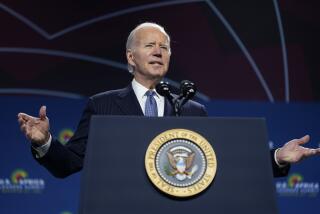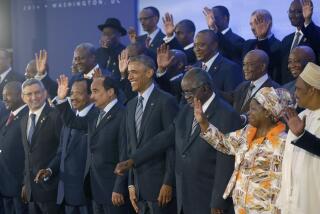Clinton Calls On Nigeria to Raise AIDS Awareness
- Share via
ABUJA, Nigeria — President Clinton warned Nigerians on Sunday that their impressive new democracy will be imperiled unless they openly and aggressively tackle the problem of HIV and AIDS.
“AIDS can rob a country of its future,” Clinton told a predominantly female crowd at the National Center for Women’s Development in Abuja, the capital.
Calling AIDS “100% preventable,” Clinton urged Nigerians to fight the stigma still associated with AIDS and start honestly discussing the disease, how it spreads and how it can be prevented.
Acknowledging that it can be an “embarrassing” and “painful” topic, Clinton challenged the group: “Is it harder to talk about these things than to watch a child die of AIDS who could have lived if the rest of us had done our part?”
The AIDS pandemic emerged Sunday as a prominent subtopic of Clinton’s second trip to Africa, whose main purpose was to stress U.S. support for the 15-month-old democracy in Africa’s most populous nation. The country of 113 million returned to a civilian government with the election of President Olusegun Obasanjo in May 1999.
“We must not let all the gains that have happened in Nigeria and throughout Africa be destroyed by a disease we can prevent if only we can get over our reluctance to deal with the uncomfortable aspects of it,” Clinton added.
About 24 million sub-Saharan Africans have AIDS or HIV, the virus that causes the disease, according to the World Health Organization.
Clinton announced no new funding for the battle against AIDS but stressed that he believes wealthy countries should do more to help provide Nigerians with affordable drugs, particularly those that prevent transmission of HIV from mothers to children. The United States is spending about $10 million to bolster a prevention and treatment campaign in Nigeria this year, three times more than it spent last year.
The administration believes that it is a pivotal time for Nigeria, where about 3 million people have AIDS or HIV. Unless a major intervention comes quickly, Nigeria could go the way of South Africa, which saw its infection rate increase from about 4% in 1993 to 20% now, administration officials warned.
Clinton made his passionate appeal on his second day in Nigeria, after visiting an impoverished village and before urging Nigerian business leaders to diversify their economy instead of relying solely on oil reserves.
For most of the past two decades, Nigeria’s corrupt military leaders plundered the country’s riches gained from oil. Nigerians are hopeful that, with a democratically elected president, they will finally feel the benefits of living in a wealthy nation. But Clinton cautioned them against focusing all their attention on natural resources.
“You’ve got to not only make sure that the money coming from the oil benefits the people, you’ve got to invest some of that money in a way that broadens the nature of the Nigerian economy if you really want people to get richer,” Clinton said to the business group.
He named the agricultural and manufacturing sectors and the Internet as areas where the country should focus its attention.
Clinton was warmly received by the group, which broke into a rousing rendition of “For He’s a Jolly Good Fellow!” after he spoke.
It was not the first time Sunday that Clinton was serenaded.
He and his daughter, Chelsea, were led to a village square Sunday morning by a cluster of smiling children who sang in sweet, high-pitched voices: “We are happy, we are happy to see your face.”
Ushafa, a village of 10,000 people, is just half an hour’s drive from the capital, but a very long way from the modern world. It has no indoor plumbing or telephones and was wired for electricity only a few months ago, after heavy lobbying by its representative, Khairat Abdulrazaq Gwadabe, one of three female senators in the National Assembly.
Villagers live in simple huts with corrugated or thatched roofs. The roads, which are dirt, were a thick orange mud from a light rain.
Gwadabe said she played a role in preparing the villagers for the president’s visit.
“I had to tell them it’s a beautiful thing when the king of the world comes to visit,” she said.
One villager, Hajiya Hanwa Mohammed, 42, said she was happy about Clinton’s visit and hopeful that it would spur him to cancel Nigeria’s debt. The U.S. is responsible for only 4% of Nigeria’s enormous $31-billion foreign debt, but Nigerian officials and citizens clearly looked to the president for relief.
“We would live better if our debt were canceled,” Mohammed said. “My children would go to school.”
Many children do not go to school in Ushafa. Even the low fees--$2 a term--for the local primary school are too high for some parents. Secondary school is out of the question for most families.
Clinton’s visit there was just a goodwill call. He made only brief remarks and then seemed to relish the attention of his audience. He was given a cream-colored robe, called a babun riga, and Chelsea was given a black wrap skirt and shawl.
The president did discuss education later in the day during his address to the business leaders.
“You don’t have enough people in school,” he said bluntly. “I think you’ve got a big interest in getting all your children in school. And it will pay rich dividends for your economy.”
Today, the president will travel to Tanzania to offer his support for Burundi’s peace process. Then Clinton will fly to Cairo to discuss Middle East peace with Egyptian President Hosni Mubarak.
More to Read
Sign up for Essential California
The most important California stories and recommendations in your inbox every morning.
You may occasionally receive promotional content from the Los Angeles Times.













